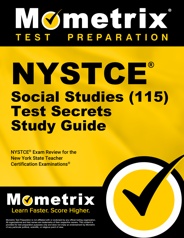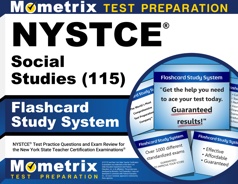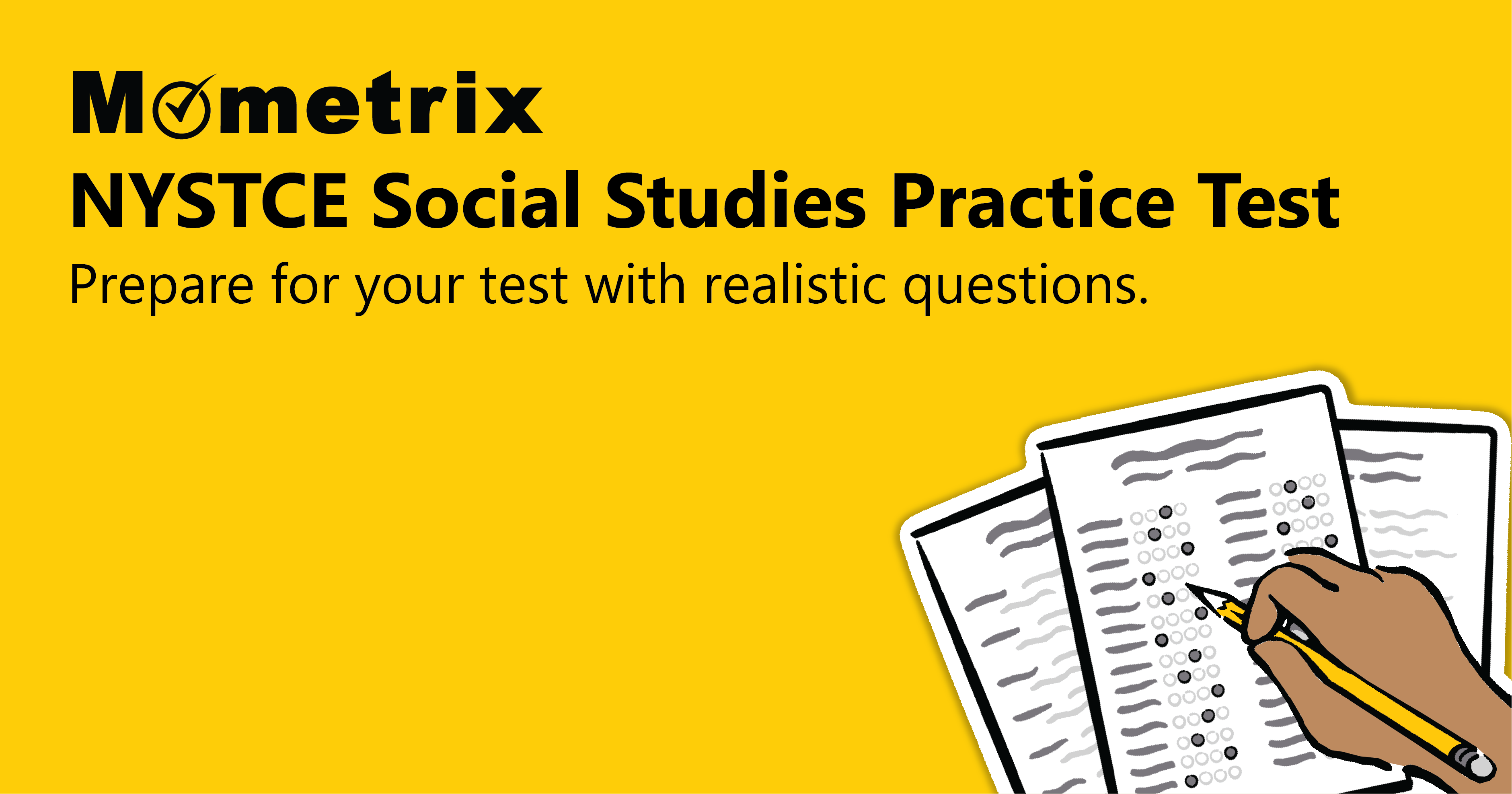The New York State Teacher Certification Exams program (NYSTCE) was designed for teachers in New York State to ensure proficiency in specific educational areas. The NYSTCE Social Studies exam is designed for candidates entering the teaching field in middle or high school social studies.
Click “Start Test” above to take a free NYSTCE Social Studies practice test, and check out our premium-quality NYSTCE test prep resources by clicking the links below!
NYSTCE Social Studies Exam Outline
The NYSTCE Social Studies exam contains 90 selected-response questions and one constructed-response question, and you will be given a time limit of 3 hours and 15 minutes.
The exam is split into seven competencies:
1. United States History (16 questions)
The questions in this competency cover the following topics:
- The global heritage of Americans and New Yorkers (prior to 1500)
- Major developments and turning points related to European exploration and colonization of the Americas and New York (1500-1763)
- Major developments and turning points during the era of the Revolution and establishment of the new nation (1754-1820s)
- Major developments and turning points during the era of expansion and reform (1801-1861)
- Major developments and turning points during the development of industrial society (1870-1900)
- Major developments and turning points during the emergence of modern society (1890-1930)
- Major developments and turning points during the Great Depression and World War II (1929-1945)
- Major developments and turning points during the postwar period (1945-early 1970s)
- Major developments and turning points during the the contemporary era (1968-present)
- Patterns of continuity and change and how they relate to larger historical processes and themes
2. Global History (16 questions)
The questions in this competency cover the following topics:
- Major developments and turning points from the beginnings of human society through the development of classical civilizations (up to 500 CE)
- Major developments and turning points during the era of expanding zones of exchange and encounter (300-1000)
- Major developments and turning points during the era of global interactions (1000-1650)
- Major developments and turning points during the emergence of the first global age (1450-1770)
- Major developments and turning points during the Age of Revolutions (1750-1914)
- Major developments and turning points during a half-century of crisis and achievement (1900-1945)
- Major developments and turning points during an era of conflict and globalization (1945-present)
- Patterns of continuity and change and how they relate to larger historical processes and themes
3. Geography (13 questions)
The questions in this competency cover the following topics:
- How to develop and use maps and other geographic tools to examine issues, problems, and questions about spatial patterns
- Organizing information about people, places, and environments in a spatial context
- Physical and human characteristics of places
- The relationships and interactions within and between human and physical systems
- The nature of regions and how humans create and use regions to organize geographic knowledge and ask geographic questions
- How people’s perceptions of places and regions are shaped by culture and experience
- The physical processes that shape the patterns of Earth’s surface
- The distribution and characteristics of human populations
- Historical events and culture and economic factors that influence human migrations
- The characteristics, complexity, and distribution of Earth’s cultural mosaics
- Connections and interactions among regions and nations
- Patterns and networks of economic interdependence
- The effect of economic globalization and the expanding use of scarce resources on relations between nations
- How physical systems and climatic factors affect human systems
- How political decisions and economic activities modify the physical environment and spatial patterns within and among various regions
- How global trade, politics, and human migration are affected by natural and human-made catastrophes
4. Economics (13 questions)
The questions in this competency cover the following topics:
- The problem of scarcity and the challenges of meeting wants and needs
- The uses of marginal analysis
- The costs of economic choices
- How voluntary exchanges, incentives, and specialization influence economic behavior
- How markets, competition, prices, and supply-and-demand help determine personal income
- The role of entrepreneurship in organizing economic activity
- The role of economic institutions and the law in market economies
- The influence of government activity on economic behavior
- Economic indicators and related tools and methods for measuring economic activity
- Factors that influence economic fluctuations
- Consequences of inflation and unemployment for the overall economy and for individuals
- The role of comparative advantage in international trade
- Arguments for and against free trade
5. Civics, Citizenship, and Government (15 questions)
The questions in this competency cover the following topics:
- The meaning of civic life and the purposes that governments serve
- Characteristics of limited and unlimited government
- Comparison of past and present political systems with the contemporary US political system
- The foundations of the US political system
- The distribution of authority and responsibility within the US government
- The structures, responsibilities, and powers of local, state, tribal, national, and international civic and political institutions
- How public policy is made
- International relations
- The purposes and functions of international organizations
- The US election process and the roles of political parties, special interest, and pressure groups
- How the US political system provides for choice and opportunities for participation
- Civic ideals
- Rights and responsibilities of US citizens
6. Social Studies Literacy (17 questions)
The questions in this competency cover the following topics:
- Citing textual evidence to support the analysis of primary and secondary sources
- Determining the central ideas/information of primary and secondary sources
- Evaluating various explanations for actions/events
- Recognizing where there is insufficient information to draw supportable conclusions
- Determining the meaning of words and phrases
- Analyzing how a complex social studies text is structured
- Evaluating authors’ differing perspectives and points of view on the same event/issue
- Integrating and evaluating multiple sources of information presented in diverse formats and media
- Evaluating authors’ premises, claims, and evidence by challenging or corroborating them with other information
- Distinguishing expressions of opinion from statements of fact
- Major interpretations of US and global history
- The relationship between historical sources and the secondary interpretations made from them
- Recognizing and testing hypotheses, inferences, and generalizations
- Identifying the uses and limitations of basic reference sources and other social studies resources
- Evaluating the appropriateness of various resources and research methodologies for meeting specific information needs
7. Pedagogical Content Knowledge (1 question)
This competency contains the only constructed-response question, and it is the only question in the competency. You will be given an exhibit of information, such as education standards or an excerpt of an example curriculum, and you will be asked to write a 400-600-word response. You will be given instructions regarding the specifics of your written response.
Check Out Mometrix's NYSTCE Social Studies Study Guide
Get practice questions, video tutorials, and detailed study lessons
Get Your Study Guide
Exam Registration
To register for the NYSTCE Social Studies (115) exam, you will need to create an NYSTCE account online and complete the registration process there. It is recommended that you complete the registration process at least 30 days before you take the exam.
During this process, you will be asked some questions about your educational history, as well as your current education level, first language, matriculation status, and the education code for the NYC Department of Education program type you are associated with.
The examination fee is $122.
Test Day
You should arrive at the testing center 30 minutes earlier than the scheduled exam time to allow time for the check-in process. Once you arrive, you will be asked to sign in and provide a valid form of government-issued photo ID. Along with your ID, you are also required to bring your own graphing calculator, as one will not be provided for you.
Before the exam begins, you will be asked to place all personal items (cell phone, wallet, keys, bag/backpack, hat, food, etc.) in a locker outside the testing room, or you may be asked to leave them in your car.
Once the test begins, you will be allowed to take breaks. However, the timer will not be stopped during your break, so use your break time carefully.
How the Exam is Scored
Your total score is based on the number of questions you answered correctly, which is then reported as a numerical figure in the range of 400-600. To pass the exam, you must achieve a scaled score of 520.
You should receive your test results roughly 2-4 weeks after taking the exam. When you receive your score report, you will see your total score, your pass/fail status, and your scores for each subarea of the test.
Check Out Mometrix's NYSTCE Social Studies Flashcards
Get complex subjects broken down into easily understandable concepts
Get Your Flashcards
FAQs
Q
How many questions are on the NYSTCE Social Studies exam?
A
There are 90 selected-response questions and 1 constructed response question on the exam.
Q
How long is the NYSTCE Social Studies exam?
A
The time limit for this exam is 3 hours and 15 minutes.
Q
What is the passing score for the NYSTCE Social Studies exam?
A
To pass the exam, you must achieve a minimum scaled score of 520.
Q
How much does the NYSTCE Social Studies exam cost?
A
The examination fee is $122.
NYSTCE and New York State Teacher Certification Examinations are trademarks of the New York State Education Department and Pearson Education, Inc. or its affiliate(s). This page was developed by Mometrix Test Preparation. It was not developed in connection with Pearson Education, Inc., nor was it reviewed, approved or endorsed by these agencies.



